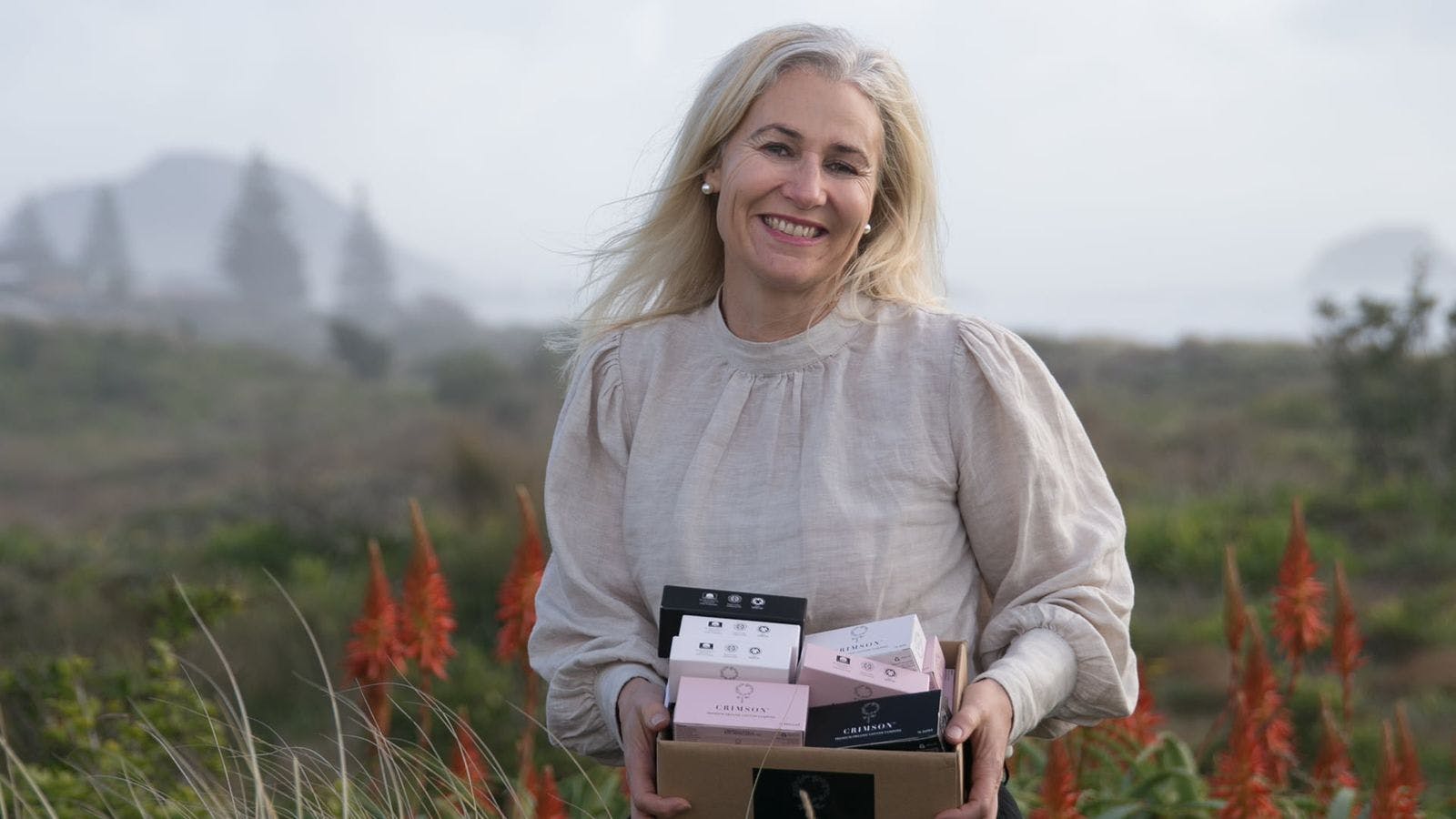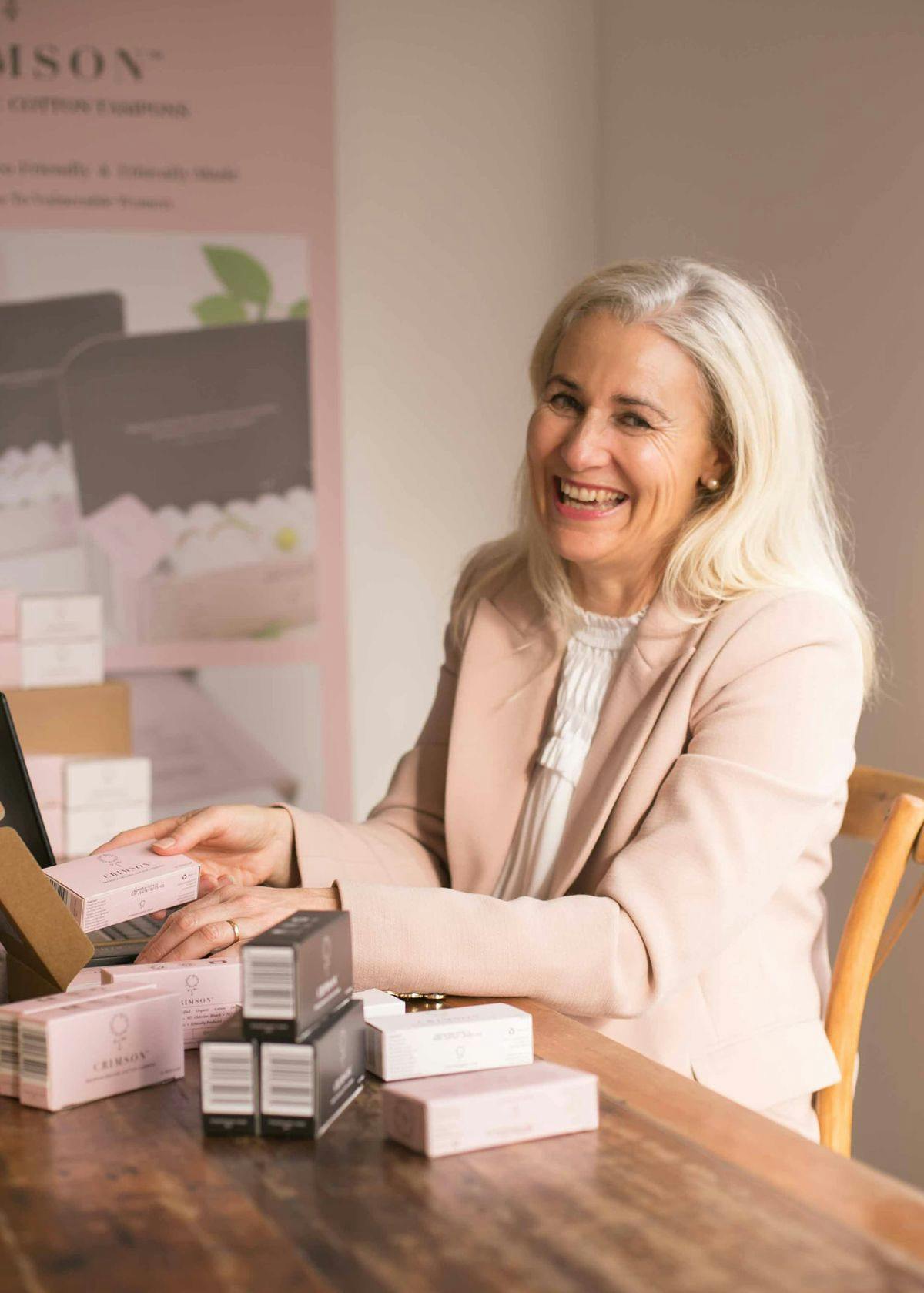19/10/2021
Barre Base Anywhere Members: Vicki Scott, Crimson Organic

Vicki Scott's mission is twofold; to make period products accessible for all, while ensuring a woman's health is not compromised. Barre Base Anywhere speaks to Youth Lawyer, and founder of Crimson Organic, Vicki Scott.
Vicki is in business for all the right reasons, believing access to safe period products is a fundamental human right. No girl should have to stay home from school because her family cannot afford period products. No woman should have to choose between food for her family and period care. Yet for many, this is a reality.
Vicki shares more on her business Crimson Organics, what she stands for, and why we all women should consider switching to organic period products.
How was the business born?
I’ve always had a strong sense of social justice. It didn’t take long to realise, in my work as a youth lawyer, that almost every young person I represent has been subjected to such sad and unjust treatment in the years leading up to their court date. The care and protection orders, the abuse, the poverty, none of that is the fault of these rangatahi. Visiting my clients at home taught me about period poverty. I’d offer to bring koha and the boys would often ask for chips or coke but the girls wanted soap and toilet paper, tampons or pads. It broke my heart to see how an inability to access these basic period products affected their health and kept these young women out of school for huge chunks of time. Which of course increased their chances of entering the justice system. It seemed to me I could do something about that, so I just had to.
How did you go about researching and launching the business?
I started by speaking with colleagues and friends who confirmed what I suspected; they would willingly support a tampon donations programme and they loved the idea of a tampon subscription service to aid their busy lives. All the women I spoke with were horrified at the thought of others having to manage periods without access to products. From there, I just threw myself into Crimson Organic, learning as I went. I read screeds and screeds. I had to figure out the online commerce world, learn about supply chains, marketing, business and importing regulations, organic cotton production and a whole lot more, while I still had three children at home and a pretty demanding job.
How do you juggle everything?
Sometimes I think I do it quite badly! Especially after suffering a serious concussion back when I was trying to launch the business. I’m healthy now but it certainly slowed me down a lot for 18 months. However, it also taught me to listen to my body more, to not push myself to the limit all the time.
In the early days, we had the whole family involved; husband, two sons and a daughter all helping to pack tampons and label boxes in the family garage. My husband is hugely supportive and his wicked sense of humour reminds me not to take myself too seriously.
What can you tell us about your involvement in the Free Period Products In Schools Programme? Why is it vital?
This fantastic project ensures period products are handed out free of charge in schools and kura throughout New Zealand. It removes stigma and financial barriers, restores dignity, keeps young people in school. Personally, it was a huge deal to me to learn Crimson Organic had been selected as one of four preferred suppliers to the programme, which was launched earlier this year. It’s addressing my dream to end period poverty faster and on a much bigger scale than I could manage with my own company.
It’s absolutely essential that we address this issue. I’ve seen the international research that links school absenteeism with young people entering the justice system.
And we know as many as 100,000 Kiwi schoolgirls have been missing up to a week of school every month because they had no access to menstrual products.
From a human rights perspective, this programme is certainly a giant step towards gender equity in schools, and life.
Do you have specific goals with Crimson Organic?
Definitely.
I want to see period poverty banished from New Zealand and I want my company to be part of the solution.
In practical terms, that means supplying tampons to young women in schools through the government initiative. But it also means supplying thousands of additional donated tampons to women’s shelters, food banks, community social programmes and the kinds of essential places that the government initiative doesn’t reach. This happens because wonderful women who can afford to buy tampons from my company donate extra boxes for those who can’t afford them. I do want Crimson Organic to continue to grow because that means I can donate even more sustainable, environmentally-friendly, organic tampons to women who need them.

What three things about menstrual health do you believe every girl/woman should know?
- Periods are not shameful or impolite or a subject to be kept hidden. Half the world’s population menstruates and it’s healthy to talk about periods.
- Period poverty forces women to seek out unsafe, unhygienic alternatives that can lead to infection and have long term health consequences.
- Go organic. Aside from being the safest option, it looks as though organic tampons may also reduce menstrual cramps and thrush. This is what anecdotal evidence suggests and the scientific research is underway but, in the meantime, endometriosis support groups recommend using organic all-cotton products.
Why is organic important?
Once I started researching and trawling through scientific reports, I was horrified. It turns out, conventional cotton is one of the most sprayed crops in the world and conventional tampons are typically made from a mixture of products that include bleached cotton, cellulose, rayon, viscose and other synthetic fibres derived from wood pulp (sawdust). Bleaching can release a by-product called dioxin.
I had no idea I’d been taking a sprayed, bleached, potentially toxic product and inserting it into one of the most absorbent part of my body.
Tampons that contain synthetics are cheaper to produce than their organic all-cotton counterparts. However, they have been repeatedly associated with toxic shock syndrome, a rare but potentially deadly illness caused by bacteria and linked to the use of tampons.
There was no question in my mind that my products had to be safe and that meant organic. As a responsible business owner, of course, I’ve also had to ensure they are sustainably produced and packaged in an environmentally-responsible way.
How did you discover the Barre Base Anywhere, and why does on-demand suit you?
My daughter Lilli, who is a third-year student at Otago University, introduced me to Barre Base. It works really well for her and has been an absolute sanity saver for me. I work from home and can work some quite odd hours so it suits me perfectly to have online classes that are accessible anytime.
I find it really motivating that classes are only 25 mins long because it’s so much easier to commit to a class of that length.
I can always justify stopping work for half an hour, knowing I don’t have to spend all that extra time changing and driving to a class, parking, scanning in, setting up and driving home again.
What is your favourite Barre Base Anywhere series?
I’m a big fan of the ‘strength and freedom’ series because, no matter how I’m feeling that day, it feels like an accessible and achievable class. Even if I’m exhausted, it feels mentally achievable. I like the way it starts off so gently then sneaks up on you, so by the time you have finished it really does feel as though you have worked your body.
On-demand barre, yoga & mobility classes.
© 2025 Barre Base · Terms · Privacy
Visit Barre Base